Amina talks about life in Sweden
On this page you can read about:
- Children in Sweden go to school every weekday.
- Children get free lunch at school every day.
- Common extracurricular activities after school hours.
- Everyone in Sweden should be treated equally. It doesn’t matter what your gender, background, or religion is, or who you fall in love with. Everyone has equal rights.
- Children have rights that adults must respect.
- In Sweden, it is important to protect the environment and to sort waste and recycle.
- The number for the police, fire brigade or ambulance is 112. You call this number in case of emergency.
Amina and the other children in the letter are fictional.
Hi!
My name is Amina and I’m 12 years old. I want to tell you about what it’s like to be a child in Sweden.
I go to school every day. All children in Sweden have to go to school, and every child has the right to do so. Since my school is close to where I live, I cycle there almost every day. I always wear a helmet, and I use a bike light when it’s dark outside. All children must wear a bicycle helmet when cycling.
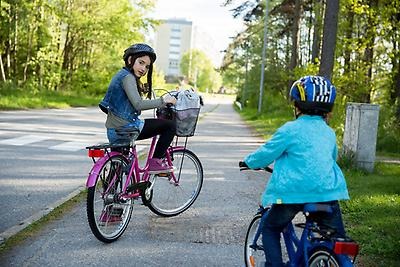
Photo: Ann-Sofi Rosenkvist/imagebank.sweden.se
I have made a lot of friends at school, both girls and boys. We play together in the schoolyard during breaks between classes. We play outside even when the weather is cold, and then it’s important to wear warm clothes.
There are no school uniforms in Sweden. You can choose which of your own clothes you want to wear to school. It can be smart to bring an extra pair of mittens if you plan to play in the snow during recess!
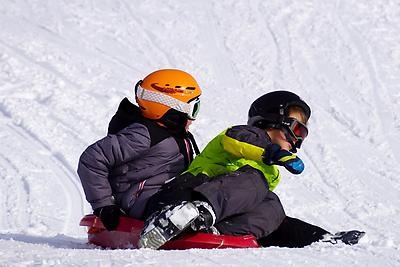
Photo: Susanne Jutzeler, Pixabay.com
School starts at 08:00 in the morning and it’s important to arrive on time. My favourite subjects are maths (mathematics) and music, but we study several different subjects every day.
At 11:30, I eat lunch together with my classmates and teachers. The food at school is very good, but I find it a bit strange that some people drink milk. That’s not common in Syria, the country where I come from. No one has to pay anything for their school lunch. I think that’s a good thing, because you need to eat to be able to learn. Today they’re serving my favourite food: spaghetti with minced meat sauce!
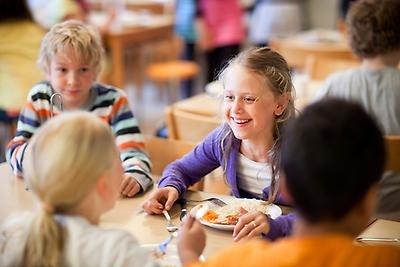
Photo: Lena Granefelt/imagebank.sweden.se
My school day ends at 15:00 in the afternoon. The younger kids sometimes need to stay at school a little longer, until their mom or dad can pick them up. Then they get to stay at “fritids” (the after-school centre) where they can play, eat a snack, and do their homework. I really enjoyed going to the after-school centre when I was younger!
Mom or Dad sometimes comes to school to meet my teachers and talk about how things are going. Then I also get to talk about what I think is good and what I might need a little extra help with.
We usually get homework assignments - schoolwork that we do at home - every week. I usually do them on my computer. It took some time to learn how to use it, but I got help from my teachers and my friends, so now it’s going great. Sometimes I need a little extra help with my schoolwork. Then my parents or teachers help me.
Something that was new to me when I came to Sweden was that adults here must respect children, just as children should respect adults. For example, this means that the teachers aren’t allowed to beat the pupils as punishment for something that happened at school. In Sweden, no adults are ever allowed to hit children! It’s against the law.
In school, we learn about more than just the usual school subjects. For example, we also learn about the environment and why it’s important to take care of our planet. You can do that by sorting waste and recycling. Recycling means using one thing to make a new thing. An empty plastic soda bottle can be recycled and become a new soda bottle. I think that’s great.
%20cecilia_larsson_lantz-recycling-1075.jpg)
A man recycles together with a child. Photo: Cecilia Lantz/imagebank.sweden.se
In Sweden, people like nature very much. It’s common to go hiking or berry-picking in the forest. There are so many berries that I don’t remember all their names! Blueberries are my favourite, and I’ve learned how to make blueberry pie.
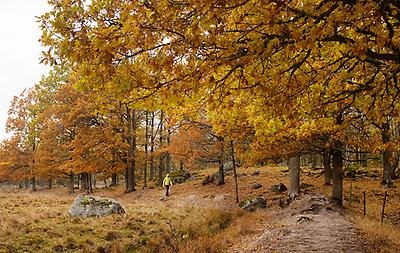
Photo: Moa Karlberg/imagebank.sweden.se
Our neighbours have an apple tree in their garden, and in the autumn they sometimes let us have some of the yummy apples. I love autumn here in Sweden. The weather gets a little chilly and it’s windy and rains a lot, but there are so many colours outside! The leaves on the trees are green at first, but in the autumn they change colour and become yellow, orange, red and brown. I’d never seen that before. When it rains, we have to wear rainwear and rubber boots, otherwise we can catch a cold!
Once a week, I go to swimming lessons after school. I really like swimming and I’ve made friends there. Sometimes I take the bus there myself. It’s just a short distance from where I live. I’ve learned how to buy a ticket and where to get off the bus.
Some of my classmates have other after-school hobbies, like football, playing musical instruments, or being a member of the scouts. I think it’s fun to hang out with my friends in the park. In the winter, we can ice skate there. In the summer, we think it’s fun to go to the lake and swim. Sometimes we just hang out at each other’s houses, playing video games or doing something else fun. Basically, we just do what we feel like.
Amina
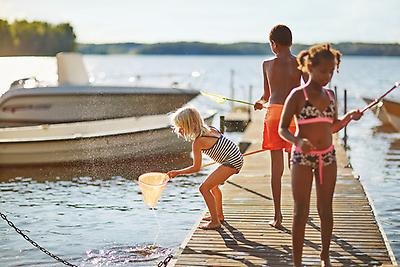
Photo: Clive Tompsett/imagebank.sweden.se
Questions to think about and discuss:
- What do you think of Amina’s letter?
- Is there anything in the letter that seems new to you?
- Do you usually go to school every day?
- What do you like to do in your leisure time?
The Convention on the Rights of the Child
Amina also writes about adults respecting children. The Convention on the Rights of the Child, which is the law in Sweden, states that children have their own rights and that we are all worth the same.
Read more about the Convention on the Rights of the Child (Länk till ungdomssidor om barnkonventionen)
Read more about the Convention on the Rights of the Child
Poster about the Convention on the Rights of the Child External link, opens in new window.
External link, opens in new window.
Emergencies
If something urgent happens, such as an accident, a fire or a crime, you should call 112.
112 is Sweden’s emergency number. An emergency is when you need urgent help from an ambulance, fire brigade or the police. These services are reliable in Sweden. Someone always answers the phone when you call. They will ask what has happened and send the right help.
Remember that you can only call 112 in emergency or life-threatening situations!